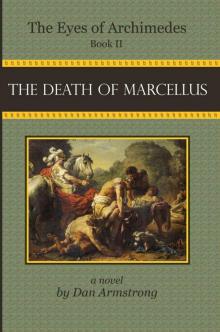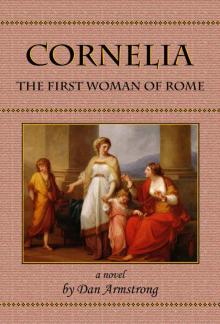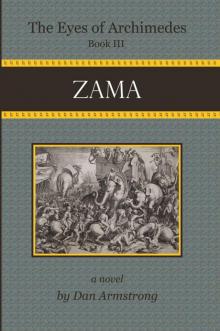- Home
- Dan Armstrong
Cornelia- the First Woman of Rome Page 3
Cornelia- the First Woman of Rome Read online
Page 3
“But where would that land come from?”
“The public land,” answered Diophanes. “There’s a lot of it, all over the peninsula, won by the conquests of the last one hundred years—most of it yet to be distributed in any way—some of it still held by those Rome took it from. Not all of it’s farmland, but quite a bit of it is.”
“And those large plantations you saw in the north, Tiberius.” Blossius refilled his cup from an amphora on the table. “Isn’t there a law that limits how much land a man can own?”
“That rings true.”
“Absolutely,” said Diophanes. “Two hundred years ago Lex Licinia Sextia established limits for both land—five hundred iugera—and livestock—I believe, one hundred cattle and one hundred sheep.”
“And many of the wealthier Romans have surely exceeded those limits,” said Tiberius. “Whatever land they have over that limit could be reclaimed and given to those without?”
“But most of those large landowners are senators,” said Diophanes.
Blossius ignored the comment. “So you’re talking about a massive redistribution of both public and private lands.”
“Yes,” stated Tiberius. “Yes.”
Cornelia and I were seated on a bench in the atrium when the men’s rapid exchanges caught our attention. Cornelia stood and motioned for me to follow her.
“I’m sure the senators will be very pleased when you offer to give their property away,” said Cornelia, gliding into the conversation. In most Roman homes this would have been considered inappropriate. Women did not join the men in serious discussion—except in my family, where debate was always open to anyone with an opinion.
Tiberius welcomed us with his usual graciousness. “What are you saying, Mother?”
Blossius was stretched out on a one-armed couch. He lifted his cup to Cornelia. Diophanes, standing, acknowledged her presence with a nod and a smile. Both men had long respected my mother for her intelligence and insight.
Cornelia came all the way into the room. Always well-dressed in an understated manner, she wore a white tunic beneath a white stola, with an overfold at the waist, held in place by a gauzy saffron sash. A matching pala draped around her shoulders and arms. Her fair but graying hair framed her face from ear to ear in an elaborate fan of cylindrical rolls, a style she tended to maintain as part of her matronly image, that also excluded face paint and jewelry. “Expect some resistance, Tiberius. That’s all I’m saying.”
“But wouldn’t the senators see the reason for it, Mother? Both Aemilianus and Appius do—and certainly they have more land than the law allows.”
“Yes, I’m sure they understand the need, but you haven’t told them it’s their land you want to give away. Be prepared for a different response.”
“We could start with the unclaimed land. I have looked into that somewhat. It’s as Diophanes says. There’s a lot of it—with huge pieces used as open pasture for cattle and sheep. The ownership is unclear at best.”
“But at some point you’ll have to redistribute land that has been claimed?”
“Only if the owner has more than the legal limit,” said Blossius. “There must be some equity in the ownership of land. Democracy is weakened when too few have too much. The addition of slaves makes it worse. Land reform will only work if it’s portrayed as being good for the state.”
“He’s right, Mother. We have just punished Mancinus for being un-Roman. In my view, Rome is on the verge of becoming un-Roman.”
“I understand the problem, and I, like both your wise advisors, agree with what you’re saying. Land reform is necessary.” She looked at each of the men, and then to me. “But if you’re planning a political strategy, part of it is knowing who the opposition is before entering the arena. Your preparation must include talking to a few large landowners prior to announcing your platform. Aemilianus, Appius, Publius Crassus, and his brother Mucius Scaevola—these are all important men with lots of land. They’re also men who respect you and will listen to you. Find out what they think. Once you have their support, talk to others, people you know might resist.”
“Appius was the first to suggest land reform to me. I know what he thinks. He believes as we do.”
“One thing Greek history has taught us,” said Blossius, “is that those who stand up to men of power suffer the consequences.”
“Maybe in Greece, but not in Rome,” stated Tiberius. “Men have argued viciously in the Senate for four hundred years and never has it come to blows.”
“Besides,” added Diophanes, “this is legislation that will appeal heavily to the populace. There is power in this kind of political action. Mobilizing the common man is at the heart of all real democracies. What you’ve got here in Rome is a bunch of wealthy senators handing the consulship back and forth among their friends, hardly the democratic ideal.”
Cornelia laughed. “Very good, Diophanes. But we have a real world to deal with here. Will you also put a limit on the number of slaves a man can own? Would that not also be necessary?”
Tiberius looked around at his friends.
“Of course,” I said. “Slaves are a big part of it, Tiberius. You’ve said that from the beginning.”
“But you wouldn’t want to limit the number of slaves right away,” said Cornelia. “You’ll have to do one thing at a time to have any chance of success. Work out the details of what you want to do, come up with a well-thought-out policy, and know that your biggest obstacle will be a handful of the wealthiest and most powerful men in the Senate.”
“Sound advice, Cornelia,” said Diophanes. “What fool thought to keep women out of the discourse?”
“Only a man who had not met my mother,” said Tiberius.
CHAPTER 5
Cornelia was the fourth and last surviving child from one of Rome’s most famous couples. Her father Africanus had defeated Hannibal; her mother Aemilia came from one of Rome’s five original families. Their offspring were considered to be among the chosen. All were given the advantage of wealth and a superior education, but only Cornelia excelled as a student and made a point of carrying on our family’s dedication to literature and art.
Publius, Cornelia’s oldest brother, twenty years her senior, was born sickly and never achieved either military or political distinction. Married with no children into his late thirties, Publius adopted my future husband Aemilianus, then died two years later, the same year that I was born. He was forty.
Her brother Lucius, three years younger than Publius, seemed to have more potential, earning the cognomen Asiaticus for minor military success in Syria where he was a praetor. But Lucius fell victim to the luxuries of the Asian lifestyle and gained a reputation for intemperance and debauchery, something entirely anathema to my grandfather’s way of thinking. When Lucius returned to Rome after his time in Syria, he was immediately accepted into the Senate, only to be cast out two years later because of dissolute living. Lucius, who never married, died two years after that at the age of thirty-four. He was considered a black mark on a family that had always been among Rome’s finest.
My mother’s sister, another Cornelia, was twelve years her senior and like Publius was not of robust health. She married her cousin Publius Cornelius Scipio Nasica at the age of eighteen, had two nonsurviving children, then died at the age of twenty-two giving birth to Cornelia’s nephew Publius Nasica, a man who plays no small part in this history.
Of the four children, Cornelia was the only one who was exceptional in any way. Being the youngest child, and only seven years old at the time of her father’s death, she received special attention from Aemilia, who took a more active part in Cornelia’s education than she had for the other children. Cornelia flourished under her mother’s supervision and immediately showed an aptitude for language, learning to read and speak Greek by the age of ten. It is a shame that Africanus, who was so disappointed with his two sons, did not live long enough to see Cornelia blossom into the woman she became.
One story I heard f
rom my grandmother when I was very young, presumably to inspire me, spoke to Cornelia’s remarkable intellectual maturity as a youth. Upon learning Greek, she promptly fell in love with Homer and quickly read both The Iliad and The Odyssey. One evening when Aemilia had a large dinner party, in which Cornelia was included though only twelve, one of the guests asked Cornelia to demonstrate her Greek. She stood from her chair, and without the presumption of a precocious child, recited the story of Odysseus and the Cyclops with unusual poise and humility. The image of my mother, as a young girl, holding a room of much older men and women spellbound with her perfect Greek, never left me, and even when she was older and well into her sixties, I could always imagine that somewhere inside her was that confident young girl—who I had always hoped to be.
CHAPTER 6
Several days after the discussion of land reform at Cornelia’s home I brought up the topic with Aemilianus. We had eaten the evening meal together in the triclinium. As was too common, neither of us had said a word during the meal. He was about to leave the table when I stopped him with a question.
“Do you think wealthy plantation owners are pushing plebeians off the land? Is that really a problem?”
Our marriage had never been a good one. I had a hard time getting pregnant. Three times I had miscarried before six months had passed. We also lost an infant in the child’s first year. My painful ankle and now noticeable limp only made things worse.
Aemilianus hesitated for a moment, as though considering whether he would deign to answer me. He stood up and straightened his tunic. He was a big man, imposing and stern, with a weather-hardened face from a career as a soldier. “No,” he said with force, and some irritation, before turning away to leave the room.
I stood up with difficulty. “Truly? You seemed to agree with Tiberius that night we had my family over for dinner.”
Aemilianus glared at me. “I hadn’t had time to think about it then. Why would you care?”
Too many of our conservations went this way. He treated my mother with deference, but not me. “It came up the other day when I was at my mother’s villa. Tiberius was talking about it with Diophanes and Blossius. They agreed with him, even added to his argument. He wants to pursue a platform of land reform.”
“That would be foolish. Laelius tried that fifteen years ago. It nearly ruined his career.” Aemilianus continued out of the triclinium, signaling the conversation was over. I followed him into the atrium.
“Isn’t there a lot of unclaimed public land that could be given to citizens without?”
Aemilianus turned on me with an ugly look, his way of shutting me up.
“What about the law that no citizen should own more than five hundred iugera?” I persisted. “Certainly many of the wealthier senators have accumulated more than that?”
He ignored the question and walked across the atrium to the library.
I called after him. “I think Tiberius is right. I think something needs to be done.”
“Who would care what you think, Sempronia?”
And that ended it. My husband’s response reminded me of what Cornelia had said about trying to take land away from the rich and powerful. Our land holdings were much greater than five hundred iugera, and Aemilianus, one of the most progressive men in the Senate, was already hedging his bets.
CHAPTER 7
In the elections that winter, Aemilianus, considered the best military mind in Rome, was elected to the position of consul for a second time, specifically to go to Numantia to put the “impudent barbarians in their place.” He went to Spain in the spring. My brother Gaius, then entering his first year of military service, went with him as an equestrian in one of Aemilianus’ four legions. Tiberius had gone to Africa with Aemilianus twelve years earlier. Now Gaius had the opportunity to spend time in a military camp with Aemilianus as an extension of his education.
But Aemilianus was more than a soldier. Following in the tradition established by my grandfather, Aemilianus was an advocate of Greek knowledge and education in general. He owned the largest collection of Greek scrolls in Italy, something he had inherited from his natural father Aemilius Paullus, who had brought the collection back from Greece after defeating the Macedonian king Perseus. Thirty thousand scrolls now filled Aemilianus’ library, making it the most renowned in Rome. Aemilianus invited scholars from all over the world to come to our home to discuss literature, philosophy, and science. The library was a big part of it. The Greek historian Polybius lived in Rome and was a fixture at these gatherings, as were the playwright Lucilius, the stoic philosopher Panaetius of Rhodes, and the tragic poet Pacuvius. Cornelia was present at many of these gatherings, and so was I.
During Aemilianus’ time in Spain that year, such was Cornelia’s esteem among Rome’s intellectual elite that she took on the role of organizing these roundtable discussions that took place in Aemilianus’ library. At the third gathering with Cornelia acting as hostess and facilitator, King Ptolemy VIII of Egypt, who was in Rome for business, made a surprise appearance at the circle, arriving in his gold embossed carriage with ten slaves and ten bodyguards.
Egypt at this time existed as two Roman provinces. King Ptolemy VIII, known as Physcon—an allusion to his large girth—ruled the western province of Cyrenaica, his brother the eastern province of Ludaea. In the year after my father’s death, Physcon was nearly killed in an assassination attempt by his brother. Physcon immediately came to Rome to demand that the Senate remove his sibling. Although his plea was dismissed, he met my mother at a dinner party while he was in Rome. She was thirty-five years old at the time, still a very attractive woman, and widely known for her intelligence and grace. Physcon, then twenty-seven and not unhandsome, made an effort to court Cornelia. One of the wealthiest men in the world, he had a certain charm and spent many afternoons with Cornelia talking about history and literature. What intimacy they might have shared I never knew, but just before he left Rome for Cyrenaica, he asked Cornelia to marry him and share his crown. It was a huge honor, and many of her friends advised her to accept, but out of respect for her recently deceased husband, she had already pledged not to remarry and declined the king’s proposal. A man accustomed to getting what he wanted, Physcon was uncommonly gracious, but he hoped Cornelia might change her mind with time, and for nearly twenty years now he visited her whenever his business brought him back to Rome.
Since his last visit two years earlier, he had married twice, both times to his sisters. The day of the second marriage he had his brother murdered to consolidate his power in the two Egyptian provinces. Then to make sure there was no male heir, he had his other sister’s twelve-year-old son killed and sent to her in small pieces. Cornelia was aware of all of this and, of course, found it unsettling.
She was in the peristyle with me cutting flowers for that evening’s gathering when my Numidian housemaid Nadia came out to the garden. She was an unusually quiet woman, ten years younger than I, with dark skin and curly black hair that she kept in a long thick braid. “The King of Egypt is here to see your mother,” she announced.
Cornelia enjoyed Physcon, but his visits were invariably unannounced and always put her on edge, this one all the more so because of the recent regime changes. I remained in the garden so she could have some time alone with Physcon. She greeted him in the entrance hall with her bouquet of freshly cut flowers.
“Flowers for me, how thoughtful,” said the king with a tip of his head.
Cornelia waved the flowers at him as though she were going to hit him. “They’re not for you. We’re having a circle this evening. You’re welcome to stay. I believe you know most of those who’ll attend.”
“Yes, that’s why I’m here. Polybius told me about it. I came early so that I might have some time with you.”
“We have until the guests begin to arrive.”
“Then I’ll get to the point.” He smiled. “You know there is no woman in the world I consider more beautiful than you.” He embraced her and kissed her on both si
des of her face.
“Your eyesight must be going, Physcon.”
“No, not at all. You have a radiance well beyond ordinary vision.”
“That must be why it doesn’t show in my mirror.”
“You’re making fun of me when I’m being serious.” He gazed at her, drawing air through his mouth, always being a little short of breath. He wore a long robe of red velvet, embroidered at the neckline, cuffs, and hem with gold wire and dotted here and there with tiny pearls. Its voluminous size disguised any sense of the shape of his body except that there was more of it than before. “There is a word that comes from the Far East, India I believe, darshan.” He struggled down to one knee. “It means to bask in the radiance of a holy person. That’s how I feel in your presence.”
Cornelia knew exactly where this was headed.
Physcon opened his hand, revealing a brilliant blue sapphire atop a ring of white gold. “Will you marry me, Cornelia? It’s the only way I can ever be happy.”
“You already have a wife, Physcon. Why are you doing this?”
“She’s my sister. That’s no marriage. It’s politics. And something I can dissolve with the snap of my fingers. All I need is a reason.” He allowed her to give him a hand as he rose to his feet. “And you are my reason.” He had large expressive eyes, full round cheeks, and a mischievous smile. He had to know she would say no, but his smile denied it.
“Nothing has changed. I still intend to honor my husband.” Cornelia walked away, headed back to the peristyle.
Physcon followed her through the atrium. It was a warm day in early summer. Sunlight shone through the portico casting shadows in wide stripes across the glazed terracotta tiles. “If you won’t marry me,” he said on drawing up alongside of her, “could we at least make love?”
Cornelia would have slapped any other man, but she knew Physcon too well and simply ignored him. “I’m surprised you’re here for the circle. Last I heard you threw all the intellectuals out of Alexandria. I know you didn’t do that to please me.”

 The Death of Marcellus
The Death of Marcellus The Siege of Syracuse
The Siege of Syracuse Cornelia- the First Woman of Rome
Cornelia- the First Woman of Rome Zama
Zama